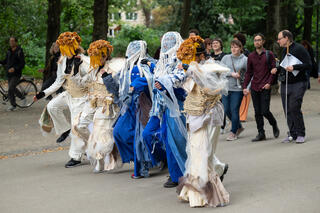Davi Pontes & Wallace Ferreira
How can a self-defence dance be shaped? Forgoing the use of sound, the audience will be placed in a circle around Brazilian artists Davi Pontes & Wallace Ferreira. Following the realisation that both state and institutions secure order through force, Davi Pontes and Wallace Ferreira present a precise and virtuosic choreography, employing martial arts and capoeira. They perform a critical reconsideration of dance history: With the Repertório Trilogy, they explore movement in the field of Black Aesthetics. Black Aesthetics describe an artistic and cultural mode of expression that concentrates on the experiences, perspectives, and identities of Black People, celebrating them. Black Aesthetics are closely bound to the history, the social struggles and the cultural accomplishments of the African diaspora. This is about questioning stereotypical depictions and offering an alternative, self-determined perspective. Davi Pontes and Wallace Ferreira use imitation and rhythmical patterns to widen the perception of time and space.
Repertório N.2 is the second piece in Davi Pontes’ und Wallace Ferreira’s choreographic trilogy. With unconventional techniques, they draw on alternative, underground self-defence practice. Through their choreographies, they undertake a critical reflection of the world in which they live, entering a choreographic process that criss-crosses through imagination and intuition. They aim to become freed of any constraints and to confront the colonial, racist, and patriarchal frame of Western thought. For an in-depth insight into Davi Pontes’ und Wallace Ferreira’s work, we additionally recommend a visit to Repertório N.3.
Davi Pontes is an artist, choreographer, and researcher working at the intersection of visual arts and choreography. He studied art at Universidade Federal Fluminense in Rio de Janeiro, Brazil, as well as at Escola Superior de Música e Artes do Espectáculo in Porto, Portugal. He has been presenting his works internationally in art galleries and at festivals for performing arts since 2016. In 2022, he and Wallace Ferreira won the Young Choreographers’ Award [8:tension] at the Viennese ImPulsTanz Festival. His work explores the connections between choreography, racism, and self-defence, and he wants to inspire the audience to enter into a critical rethinking and reflection on the production of history.
Wallace Ferreira is an artist with a background in dance and visual arts. Ferreira studied at the Escola Livre de Artes da Maré (ELÃ) as well as at the Artes Visuais do Parque Lage in Brazil. In 2022, Ferreira and Davi Pontes won the Young Choreographers’ Award [8:tension] at the Viennese ImPulsTanz Festival. Wallace Ferreira’s works have been shown internationally both at art galleries as well as at festivals for performing arts. Wallace Ferreira’s creations scrutinise convention and explore the intersections of movement, performance, voguing, and visual representation.
Duration: 30 minutes
Accompanying programme
|
Fri 23.05. 18:00 |
|
| Fri 23.05. afterwards |
An Artist Talk(s) with Davi Pontes and Wallace Ferreira moderation: Felipe dos Santos Boquimpani, in English and Brazilian Portuguese (for more info see below) |
| Sat 24.05. 20:00 | Repertório N.3 |
An Artist Talk(s) with Davi Pontes & Wallace Ferreira
„The experience of trance is precisely this: to inhabit different temporalities and to produce, in a body, multiple corporealities. From the many historical time zones that co-form that state, gestures, voices, speeches, syntaxes emerge. They no longer foretell the present’s many futures but indicate pasts we are yet to live.“ (José Fernando Peixoto de Azevedo: Letter to Lepecki, 2021, p. 163).
The repertoires of Davi Pontes & Wallace Ferreira confront us with the question of the temporality of violence - with its repetitions, suspensions and recurrences, with its transmutations, refinements and persistence. In conversation with the theater artist and scholar Felipe dos Santos Boquimpani, we consider to what extent the scenic arts in the current transnational and postcolonial constellation are involved in a complex and delicate discussion of the historical entanglement between violence, culture, and ideological societies: What temporalities are recovered, imagined and deferred in the transit between formally former colonies and metropoles? What kind of bodies are produced there? And what knowledge do they presuppose? For if States, institutions and choreographies reinforce colonial, racial and hetero-cis-patriarchal orders, Pontes & Ferreira develop a power play that reverses and returns this negative. But how can another time be embodied in the public?
In co-operation with the Emmy Noether Junior Research Group (DFG) Dramaturgies in the Afterlife of violence: transnational Theater between Global South and North at the Ruhr University Bochum: https://dramaturgies-afterlife.de/
Felipe dos Santos Boquimpani Felipe is a curious raindrop in the thicket. Having two children, he plays theater scholar and sometimes still has time to take himself seriously as an artist. He studied Scenic Arts (B.A. majoring in Theater Directing, 2012-2017) at the University of São Paulo and Applied Theater Studies (M.A., 2018-2022) in Giessen. Since 2024 he has been a research associate in the Emmy Noether Research Group “Dramaturgies under the Afterlife of Violence: Transnational Theater between Global South and North” at the Institute for Theater Studies at the Ruhr University Bochum.
His research interests include artistic processes, forms of rehearsal and work organization, theories of representation from epistemology to political philosophy, cultural ethno-anthropology, theories of subjectivity, formations of personal and social memory, non-modern temporalities and decolonial strategies.
The main research question of his Ph.D. project "Equivocations of Decolonial Theater" focuses on how aesthetic and epistemological anti-colonial strategies are developed through transnational artistic processes between Brazil and Europe, especially on the question of epistemic and aesthetic violence or extractivism. As an artist himself, Felipe is a trained theater director, experienced lighting designer and occasionally also a performer.

Concept and performance: Davi Pontes, Wallace Ferreira; Management and distribution: Something Great; Commissioned by Frestas - Trienal de Artes 2020/21 - O rio é uma serpente, curated by Beatriz Lemos, Diane Lima and Thiago de Paula Souza.
Supported by the Alliance of International Production Houses, funded by the Federal Government Commissioner for Culture and the Media.








